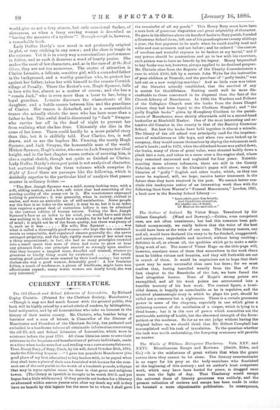CURRENT LITERATURE.
The Old Church and School Libraries of Lancashire. By Richard Copley Christie. (Printed for the Chetham Society, Manchester.) —Though it may not find much favour with the general public, this book will be highly prized by a select circle of readers, by bibliophiles, local antiquaries, and by all Lancastrians who take an interest in the history of their native county. Mr. Christie, who, besides being a barrister and a man of letters, is Chancellor of the Diocese of Manchester and President of the Chatham Society, has gathered and embodied in a handsome volume all obtainable information concerning the old Ch Irch and School Libraries of Lancashire, which were in existence before the year 1750. All these libraries seem to owe their existence to the bequests and benefactions of private individuals, made at a time when books were few and reading was a rare accomplishment. Thus, Henry Bury, of Bury, Clerk, by his will, dated October 20th, 1634, made the following bequest :—" I geve ten pounds to Manchester (the good place of my best education) to buy bookes with, to be payed when they shall have a place of their own furnished with bookes for the com- mon use of the said pariah to the worth of a huudreth pounds, a thynge that may in myne opinion Boone be done in that great and religions towne. (The library at Ipswich is thought to be worth 300 li. and yet began but a little while ague.) If they provide not bookes for a liberary as aforesaid within seaven yeares next after my death my will is they have no benefit by this legacie but the same be to whom I shall gave the remainder of all my goods." This Henry Bury must have been a man both of generous disposition and great originality of character. He gave in his lifetime above six hundred books to Bury parish, foauded a Grammar School there, left one of his grandnephews twenty shillings a year, the first payment to be made when he could readily read and write and cast accounts, and not before ; and he ordered "the custom of needless and wasteful expense to be broken at my burial," and if any person should be contentious and go to law with his executors, such person was to have no benefit by his legacy. Money bequeathed to buy books was not, however, always applied to its destined purpose. Mr. Christie cites from the Reports of the Charity Commissioners a case in which £100, left by a certain John Wyke for the instruction of poor children at Prescott, and the purchase of "godly books," was laid out on a new weighing-machine ! And so little care was taken of the libraries actually established, that the survival of any is matter for thankfulness. Nothing could well be more dis- creditable to those concerned in its dispersal than the fate of the Church Library of Manchester. In 1830, the Wardens and Fellows of the Collegiate Church sent the books from the Jesus Chapel (where they had been kept) to the Chetham Hospital ; and "the godly English books" given by Humphrey Chetham to the parish- ioners of Manchester, were shortly afterwards sold to a second-hand bookseller at Shudehill Market. One of the most interesting and ex- tensive old libraries in the county is that of the Burnley Grammar School. But how the books have held together is almost a miracle. The library of the old school was principally used for the imprison- ment of mischievous or idle boys, and when two were locked-up in company, they would amuse themselves by shying the volumes at each other's heads ; and in 1872, when the old school-house was pulled down, the books, many of them of great value, were shunted bodily down a plank into a cart, and taken to a room over a fire-engine shed, where they remained uncovered and neglected for four years. Notwith- standing these adverse influences, there are still in the County Palatine, as reference to Mr. Christie's pages will show, many old libraries of " godly " English and other books, which, as they can never be replaced, will, we hope, receive better treatment in the future than they have received in the past. We cannot better con- clude this inadequate notice of an interesting work than with the following lines from Weever's "Funeral Monuments," London, 1631, a book now in the Burnley School Library :— " LaneAshire gave him breath, And Cambridge education. His studies are of death,
Of Heaven his med.tation."


































 Previous page
Previous page